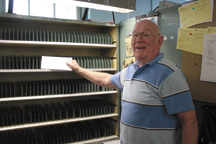For a greater part of four decades, even a stranger could tell the ethnic makeup of a neighborhood along Bayonne’s east side just by listening to James Hennessey sing. He would sing or whistle along his route, often reflecting the neighborhood he was in by singing songs connected to the ethnicity of the people living there.
From the late 1940s to the early 1980s, Hennessey traveled along Avenue F and Prospect Avenue delivering people’s mail.
He lived up to the old United States Postal Service motto because he never let the weather stop him.
“If it was a Polish neighborhood, I sang Polish songs. If it was Irish, I sang Irish,” he recalled during an interview earlier this summer after he was honored for celebrating his 60th year as a member of the National Association of Letter Carriers Union.
Sitting in the post office with former colleagues last June, Hennessey recounted many of his adventures, exploits with strange pets, and the one time he got so wet from trying to “walk between the rain drops” that one local cleaner dried his clothing for him.
But what he remembers best are the people, still able to associate an address with a name. Many of them were public figures that became councilmen, mayors, or even congressmen. But most of the people he met on his route were ordinary people, and most of them were glad to see him when he came. Many recognized his voice and the songs he sang as he walked those long blocks.
Drafted into the Army
A graduate of the now-defunct Bayonne Technical High School, Hennessey was drafted into the United States Army in time to serve in WWII. Born in 1925, he was one of 10 children, four boys and six girls, raised after his father died in 1930.
Like most graduates of the technical school, he envisioned a life as a blue collar worker – one of the many who populated Bayonne during its heyday as a city of industry.
The war diverted him and sent him to Europe, where he fought and was later wounded.
Discharged in December 1945, Hennessey was part of a new world and – like many who returned – looked to start his life.
Perhaps the two most significant moments of his life came in the same year. He married a local gal, Dolly Tagliareni, and started his job with the U.S. Postal Service in 1949. He remained there until his retirement in 1982.
Post Master Terrence Ruane, who is likely to retire shortly, called Hennessey a “25-year legend” with the post office in Bayonne.
If he wasn’t singing, he was whistling, Hennessey said.
“I enjoyed the work, and people treated me good,” he said.
He started with the post office during the Christmas rush and decided he liked the work. “I liked being outdoors,” he said.
Like most postmen, he is full of interesting tales.
________
Photographs of Hennessey from that time make him look as if he stepped out of a Norman Rockwell painting, very much a picture of what American style looked like during that era.
He knew everyone in his neighborhood, and many of these people were already powerful political people, such as Freeholder Neil Carroll or Rep. Neil Gallagher.
Important person
Like most postmen, he is full of interesting tales of strange incidents and unique characters he encountered on his rounds, encountering every sort of situation.
Yet it was the day-in and day-out routine he seemed to love, walking through the familiar landscape of Bayonne, talking to the people who lived there, growing up with their pets and their kids, and often, delivering to them notices that played important roles in their lives.
He said after all these years, he misses the people he delivered to and the people he worked with.
Even as he talked about the past, he got choked up remembering it. He didn’t do it for money, he said. Postmen made steady pay, but not a fortune. He started at $1.19 per hour, but had to purchase his own uniform. In 1958, he was making about $3,500 a year, not including overtime.
He considers himself a lucky man and would do it all again if he had to.
“I loved my job, never wore gloves, earmuffs, or a rain coat,” he said. “I always said I would walk between the rain drops.”
And he always kept on schedule.
Al Sullivan may be reached at asullivan@hudsonreporter.com.
